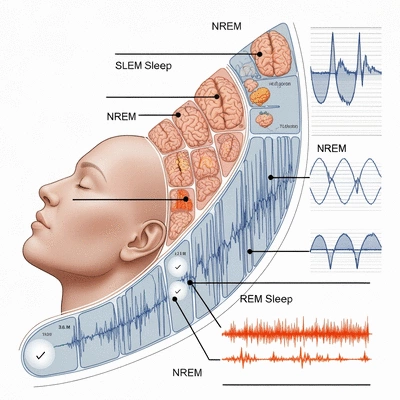Have you ever found yourself tossing and turning at night, desperate for the restful sleep that seems just out of reach? Understanding the intricacies of sleep cycles can be your first step toward reclaiming those peaceful nights. Let’s explore the vital lessons that can transform your sleep experience!
What You Will Learn
- Sleep consists of distinct stages: N1 (light), N2 (moderate), N3 (deep), and REM (active dreaming), each playing a critical role in restoration.
- Disrupted sleep cycles can lead to insomnia, affecting cognitive function, mood, and overall health.
- Circadian rhythm regulates your sleep-wake cycle; maintaining consistent sleep times enhances sleep quality.
- Effective strategies, such as cognitive behavioral therapy and sleep hygiene practices, can mitigate insomnia symptoms.
Understanding Sleep Cycles: Stages and Impact
The visual below illustrates the distinct stages of a typical sleep cycle, their durations, and their crucial impact on overall well-being. Each stage plays a vital role in physical and mental restoration.
Sleep Cycle Stages
A typical sleep cycle (approx. 90 minutes) progresses through NREM and REM stages, repeating multiple times per night.
- N1: Light Sleep (few min)
- N2: Moderate Sleep (50% total)
- N3: Deep Sleep (physical recovery)
- REM: Active Brain (dreaming, emotion)
Impact of Disrupted Sleep
Disruptions to sleep cycles can lead to a range of negative health outcomes, affecting both mind and body.
- Increased Stress Levels
- Higher Risk of Chronic Diseases
- Impaired Cognitive Functions
- Negative Mood & Relationships
Circadian Rhythm Alignment Tips
Maintaining a healthy circadian rhythm is key for optimal sleep architecture and overall well-being.
- Limit Screens Before Bed
- Consistent Sleep/Wake Times
- Relaxing Bedtime Routine
- Daily Natural Light Exposure
Empowering Your Sleep Journey
Actionable steps to take control of your sleep quality and improve your nightly rest.
- Keep a Sleep Journal
- Adopt Healthy Sleep Practices
- Explore Behavioral Therapies (CBT-I)
- Seek Professional Support
Understanding Sleep Cycles: The Fundamentals
Have you ever wondered what really happens while you sleep? Understanding sleep cycles is crucial for anyone looking to improve their sleep quality. In a typical sleep cycle, we go through several stages, which can be categorized into non-rapid eye movement (NREM) sleep and rapid eye movement (REM) sleep. The NREM is further divided into three stages: N1 (light sleep), N2 (moderate sleep), and N3 (deep sleep), followed by REM. Each of these stages serves a unique purpose and typically lasts about 90 minutes, repeating several times throughout the night. For a thorough overview of these stages, you can refer to authoritative sources like the Sleep Foundation's guide to the stages of sleep.

During N1, we transition from wakefulness to sleep, which lasts only a few minutes. N2 is where we spend about 50% of our total sleep time, and it plays a vital role in memory consolidation and learning. N3, also known as deep sleep, is essential for physical restoration and growth. Finally, we enter REM sleep, where dreaming occurs, and our brains are highly active, which is crucial for emotional regulation. Grasping these stages can help us understand how to achieve better sleep quality and avoid insomnia.
What Are Sleep Stages and How Do They Work?
- N1: Light sleep, lasting a few minutes.
- N2: Moderate sleep, about 50% of total sleep time.
- N3: Deep sleep, vital for physical recovery.
- REM: Active brain state where most dreaming occurs.
These stages interconnect through cycles, emphasizing the importance of uninterrupted sleep for optimal rest. If one stage is disrupted, it can lead to feelings of fatigue and grogginess the next day. That's why focusing on your sleep hygiene is essential, a concept I often explore at Sleep Well Insights.
The Importance of Sleep Cycles for Overall Health
Sleep cycles are not just about feeling rested; they significantly impact our overall health. A well-structured sleep cycle supports cognitive functions, emotional well-being, and physical health. Disrupted sleep patterns can lead to a range of issues, from impaired memory and focus to increased susceptibility to stress and anxiety. It’s essential to recognize the toll that poor sleep can take, as many people underestimate its effects. Research on sleep disorders, like that highlighted by the National Heart, Lung, and Blood Institute, underscores the broad impact of sleep on health.
Consequently, improving sleep quality should be a priority. Here are some key consequences of disrupted sleep patterns:
- Increased stress levels
- Higher risk of chronic diseases
- Impaired cognitive functions
- Negative impacts on mood and relationships
Understanding these ramifications can motivate you to take actionable steps toward better sleep hygiene, which I passionately advocate at Sleep Well Insights.

How Circadian Rhythm Influences Sleep Patterns
Circadian rhythm is like your body's internal clock, regulating your sleep-wake cycle over a 24-hour period. This natural rhythm influences when you feel alert and when you feel sleepy, heavily impacting your sleep quality. Factors like exposure to light, your daily routine, and even your eating habits can shift this rhythm. That’s why maintaining consistent sleep and wake times is so important!
When your circadian rhythm is misaligned, it can result in poor sleep architecture and lead to insomnia. To support a healthy circadian rhythm, consider these tips:
- Limit exposure to screens before bedtime
- Create a relaxing bedtime routine
- Be consistent with sleep and wake times, even on weekends
- Get natural light exposure during the day
Managing your circadian rhythm can pave the way to more restful nights and rejuvenated days, an area I focus on extensively in my research and at Sleep Well Insights.
Insomnia: An Overview of Types and Causes
As we transition into discussing insomnia, it's crucial to differentiate between various types and their underlying causes. Understanding this can empower you to tackle your sleeplessness more effectively. Insomnia can be complex, but with the right knowledge, we can navigate its challenges together!
Frequently Asked Questions About Sleep Cycles and Insomnia
Here are some common questions about sleep cycles and insomnia, to help you better understand and manage your sleep health.
What are the main stages of a sleep cycle?
A sleep cycle consists of NREM (Non-Rapid Eye Movement) and REM (Rapid Eye Movement) sleep. NREM is further divided into N1 (light sleep), N2 (moderate sleep), and N3 (deep sleep).
How long does a typical sleep cycle last?
A typical sleep cycle lasts approximately 90 minutes and repeats several times throughout the night.
What is the importance of deep sleep (N3)?
Deep sleep (N3) is crucial for physical restoration, growth, and cellular repair, making it vital for overall health.
How does disrupted sleep affect cognitive function?
Disrupted sleep can impair memory, focus, problem-solving abilities, and overall cognitive performance, leading to feelings of grogginess and reduced productivity.
What is circadian rhythm and how does it impact sleep?
The circadian rhythm is your body's internal clock that regulates the sleep-wake cycle over a 24-hour period. It influences when you feel alert or sleepy, and its misalignment can lead to poor sleep quality and insomnia.
What are some effective strategies to improve sleep quality?
Effective strategies include maintaining consistent sleep and wake times, creating a relaxing bedtime routine, limiting screen exposure before bed, getting natural light during the day, and considering behavioral therapies like CBT-I.
Pro Tip
To enhance your sleep quality, try establishing a calming pre-sleep routine. Engaging in relaxing activities such as reading, gentle stretching, or meditation can help signal your body that it's time to wind down, making it easier to transition into sleep and improve your overall sleep cycles.
Key Takeaways on Sleep Cycles and Insomnia
Understanding sleep cycles and the nature of insomnia is crucial for anyone looking to improve their sleep quality. Sleep cycles consist of several stages, including NREM and REM sleep, each playing a vital role in our overall well-being. When these cycles are disrupted, it can lead to insomnia, which can significantly impact daily life. Here are some essential points to remember:
- Sleep consists of multiple stages that are necessary for physical and mental restoration.
- Insomnia can be acute or chronic, with varying symptoms and causes.
- Effective management strategies, such as cognitive behavioral therapy (CBT-I), can help restore healthy sleep patterns. Information on clinical trials for sleep disorders, including those involving CBT-I, can be found through resources like the National Institute of Mental Health.
At Sleep Well Insights, we believe that understanding these concepts is the first step towards achieving restful nights. The connection between insomnia and disrupted sleep architecture is significant, highlighting the need for effective management.
Empowering Yourself for Better Sleep
Now that we’ve covered the fundamentals of sleep cycles and insomnia, it’s time to take action! Implementing the insights gained from this article can help you take control of your sleep quality. Remember, it’s essential to assess your sleep habits and consider seeking professional help if needed. Here are some steps you can take:
- Keep a sleep journal to track your patterns and identify triggers.
- Adopt healthy sleep practices, such as establishing a consistent bedtime routine.
- Explore behavioral therapies, like CBT-I, to address underlying issues.
By taking these steps, you can empower yourself to improve your sleep quality. Sometimes, simply understanding the dynamics of sleep can pave the way for better nights and rejuvenated lives. Don't hesitate to reach out for support; at Sleep Well Insights, we're here to guide you on your journey to sound sleep!
Recap of Key Points
Here is a quick recap of the important points discussed in the article:
- Sleep consists of multiple stages: N1 (light sleep), N2 (moderate sleep), N3 (deep sleep), and REM (dreaming).
- Disrupted sleep cycles can lead to insomnia and negatively affect cognitive function, mood, and overall health.
- Maintaining a consistent sleep schedule and a relaxing bedtime routine supports a healthy circadian rhythm.
- Effective management strategies, such as cognitive behavioral therapy, can help restore healthy sleep patterns.
- Tracking sleep patterns through a sleep journal can help identify triggers and improve sleep quality.










